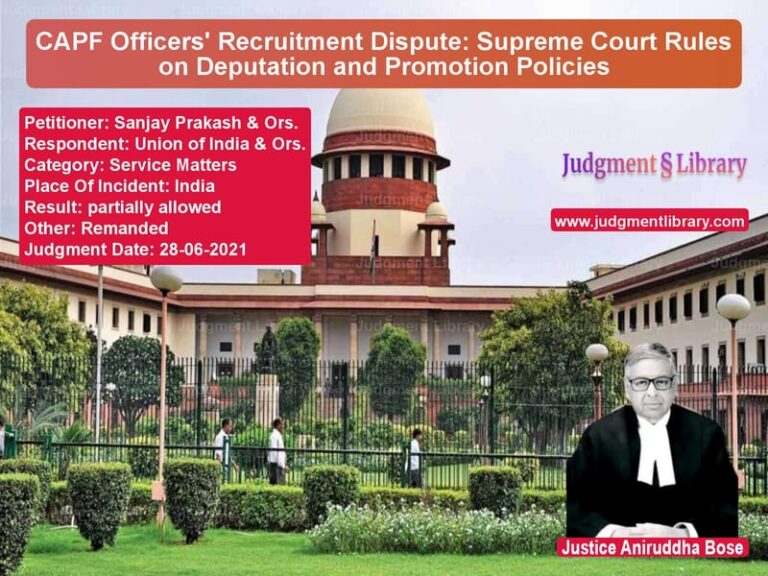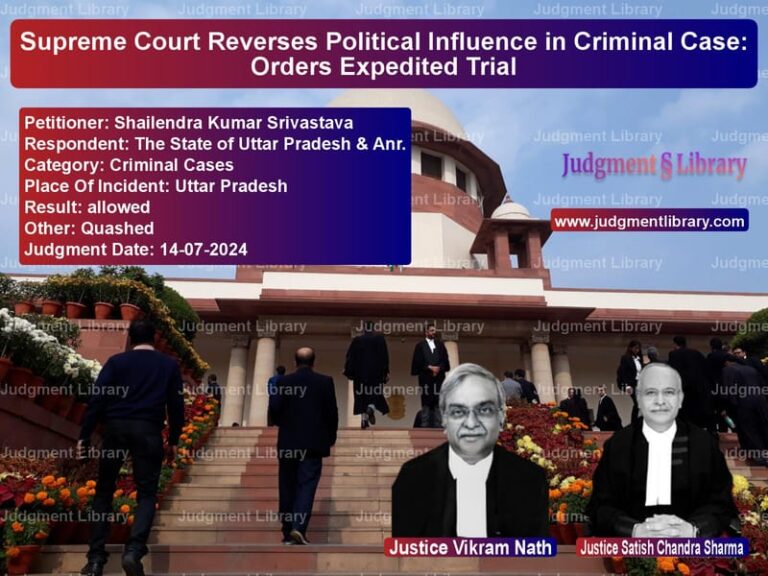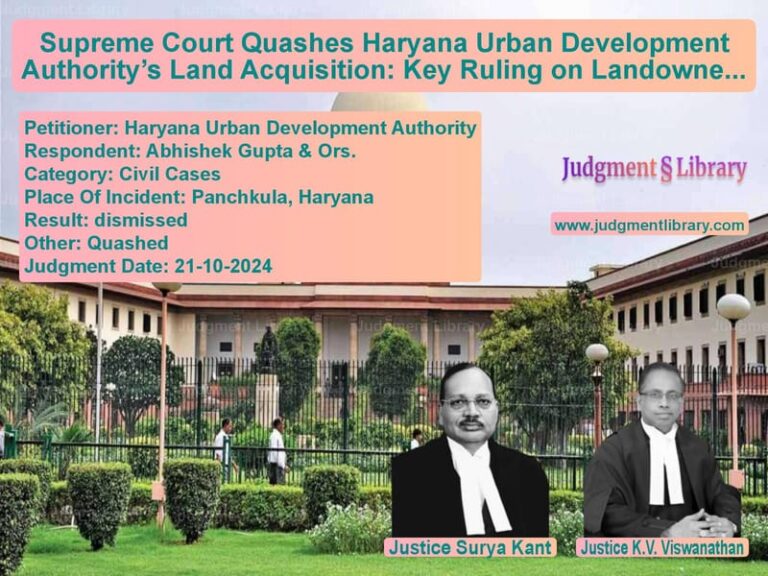Supreme Court Strikes Down Gender Restriction in Domestic Violence Act
The Supreme Court of India, in the case of Hiral P. Harsora and Others v. Kusum Narottamdas Harsora and Others, delivered a landmark judgment on October 6, 2016, addressing the constitutional validity of Section 2(q) of the Protection of Women from Domestic Violence Act, 2005 (DV Act). The ruling struck down the words ‘adult male’ from the definition of ‘respondent,’ expanding the scope of the Act to include female perpetrators of domestic violence.
This judgment reaffirmed the principle of gender neutrality in domestic violence cases and reinforced the protection available to victims, regardless of the gender of the abuser. The Court held that the restrictive definition of ‘respondent’ was discriminatory and violated Article 14 of the Constitution, which guarantees equality before the law.
Background of the Case
The case arose from a complaint filed by Kusum Narottam Harsora and her mother against their son/brother and his wife and two daughters, alleging domestic violence. Initially, the complaint was withdrawn but later refiled in 2010. The respondents sought discharge on the ground that under Section 2(q) of the DV Act, only an ‘adult male’ could be considered a respondent. The Bombay High Court upheld this interpretation, prompting the petitioners to challenge the constitutional validity of Section 2(q) before the Supreme Court.
Key Issues Raised
- Whether restricting ‘respondent’ to an ‘adult male’ under Section 2(q) of the DV Act was constitutional.
- Whether the exclusion of female perpetrators from the ambit of the Act violated Article 14 of the Constitution.
- Whether the principle of severability could be applied to remove the unconstitutional portion of the provision while maintaining the Act’s overall integrity.
Arguments Presented
Petitioners’ (Harsora Family) Arguments
- The definition of ‘respondent’ in Section 2(q) was discriminatory and contrary to the object of the DV Act, which was to protect victims of domestic violence.
- Many instances of domestic violence involve female perpetrators, such as mothers-in-law or sisters-in-law, and the Act should not be restricted to cases involving male abusers.
- The phrase ‘adult male’ was an arbitrary classification that lacked any rational nexus with the purpose of the Act.
- The High Court’s interpretation made the Act ineffective in cases where the abuser was a female relative.
Respondents’ Arguments
- The DV Act was enacted to protect women from domestic violence, particularly in a patriarchal society where women were often victims of male aggression.
- The restriction of ‘respondent’ to ‘adult male’ was a conscious legislative choice aimed at addressing a specific social evil.
- Removing this gender restriction would lead to misuse of the Act against women, contradicting its legislative intent.
- Any changes to the Act should be made by the legislature, not the judiciary.
Supreme Court’s Judgment
The Supreme Court ruled that the words ‘adult male’ in Section 2(q) were unconstitutional and should be removed. The key observations included:
- On Gender Neutrality: The Court held that domestic violence could be perpetrated by both men and women, and the law should not create artificial gender distinctions.
- On Article 14 Violation: The Court found that limiting the scope of ‘respondent’ to males violated the right to equality and denied protection to victims of female-perpetrated violence.
- On Legislative Intent: The ruling emphasized that the objective of the DV Act was to prevent domestic violence and protect victims, not to limit the identity of abusers.
- On the Principle of Severability: The Court applied the doctrine of severability to remove the unconstitutional words while upholding the rest of the Act.
The Court stated: ‘We, therefore, strike down the words ‘adult male’ before the word ‘person’ in Section 2(q), as these words discriminate between persons similarly situate, and far from being in tune with, are contrary to the object sought to be achieved by the 2005 Act.’
Legal Precedents Cited
The Court referred to several landmark judgments on constitutional interpretation and equality:
- State of West Bengal v. Anwar Ali Sarkar (1952): Held that classification under Article 14 must have a rational nexus to the objective of the law.
- D.S. Nakara v. Union of India (1983): Affirmed that arbitrary classifications that deny equal treatment are unconstitutional.
- Badshah v. Urmila Badshah Godse (2014): Interpreted protective statutes in favor of the vulnerable group they were meant to protect.
Impact of the Judgment
This ruling has far-reaching implications for the interpretation and enforcement of the Domestic Violence Act:
- Expansion of Protection: Victims can now file domestic violence complaints against female relatives and minor male perpetrators.
- Stronger Legal Framework: Ensures that the law is applied equally and does not exclude certain abusers based on gender.
- Precedent for Gender-Neutral Laws: Strengthens the case for making more protective laws gender-neutral.
- Judicial Oversight on Legislative Classification: Affirms that courts have the power to strike down arbitrary classifications that violate constitutional rights.
Conclusion
The Supreme Court’s decision in Hiral P. Harsora and Others v. Kusum Narottamdas Harsora and Others is a landmark ruling that ensures a more comprehensive application of the Domestic Violence Act. By striking down the restrictive words ‘adult male’ from Section 2(q), the Court has expanded the scope of protection for victims of domestic violence, ensuring that no perpetrator escapes liability based on gender.
This judgment serves as a significant step toward achieving true equality in domestic violence laws, reinforcing the principle that all victims deserve protection, irrespective of the identity of their abuser.
Don’t miss out on the full details! Download the complete judgment in PDF format below and gain valuable insights instantly!
Download Judgment: Hiral P. Harsora and vs Kusum Narottamdas Ha Supreme Court of India Judgment Dated 06-10-2016.pdf
Direct Downlaod Judgment: Direct downlaod this Judgment
See all petitions in Fundamental Rights
See all petitions in Constitution Interpretation
See all petitions in Public Interest Litigation
See all petitions in Judgment by Rohinton Fali Nariman
See all petitions in Judgment by Kurian Joseph
See all petitions in allowed
See all petitions in Modified
See all petitions in supreme court of India judgments October 2016
See all petitions in 2016 judgments
See all posts in Constitutional Cases Category
See all allowed petitions in Constitutional Cases Category
See all Dismissed petitions in Constitutional Cases Category
See all partially allowed petitions in Constitutional Cases Category







